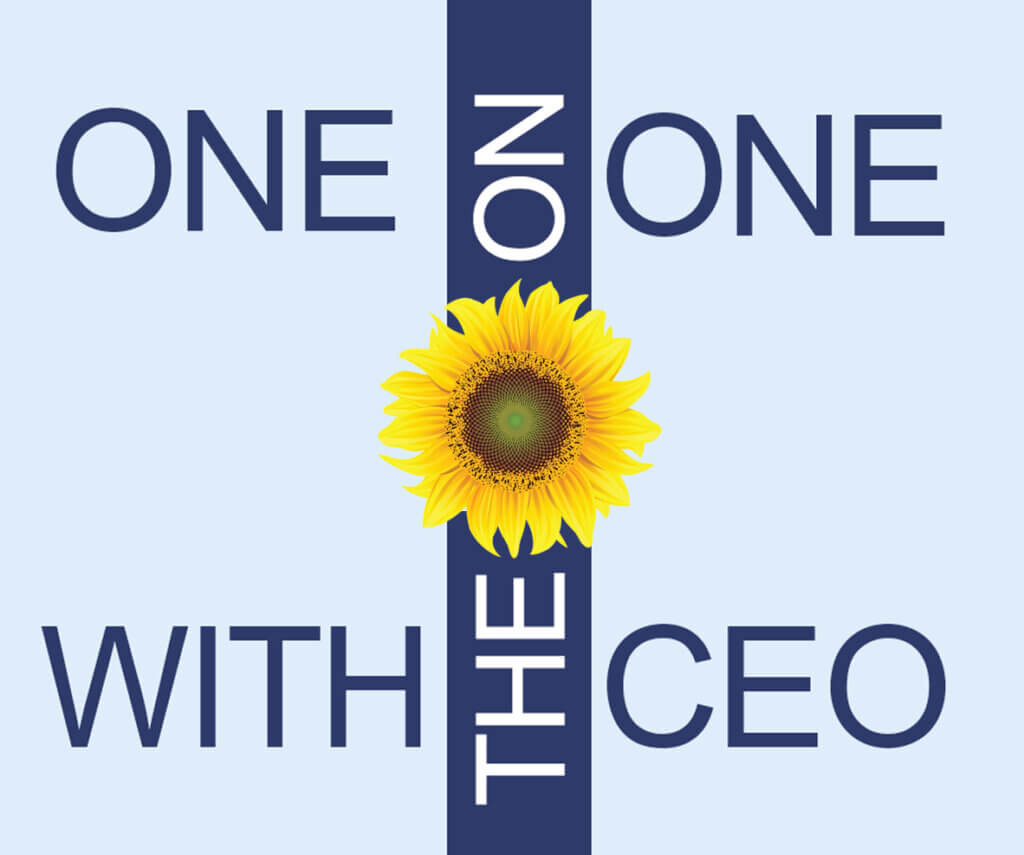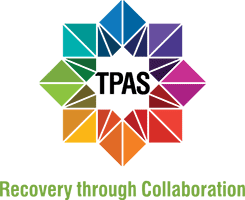
In honor of World Mental Health Day in early October 2023, we hosted an important conversation with our Chief Clinical Officer, Johnnie Featherston, MA, LCMHC. The focus was on mental health as a basic human right. We hope you enjoy the series, “ONE on ONE with the CEO.” Be sure to subscribe to our YouTube channel so you don’t miss any of them.
“…I thought, this cannot be. It starts out like this… ‘What if those of us living with a mental illness are not living with a genetic mutation, but an amazing evolutionary adaptation? What if mental illness is, as Malcolm Gladwell says in his book ‘David and Goliath’, of such things ‘It is a desirable disadvantage’. You would never wish it on anybody. However, it comes with certain advantages. I believe my depression and thoughts of suicide are simply the flip side of my creativity, imagination, comic ability. Same brain, same wiring…”
Frank King
Suicide Prevention Speaker and Trainer, Former Writer for The Tonight Show
Read the entire transcript below:
[ERIC] Hey, this is really cool of you to do this, by the way…
[FRANK] Oh, yeah. I was born and raised in Raleigh. I went to school in Chapel Hill.
[ERIC] You went to Chapel Hill?
[FRANK] Class of 79.
[ERIC] I’m a Maryland Terrapin. When I hear that, it makes my heart pitter patter with sadness.
[FRANK] Um, yeah, I’m sorry, man. Nobody’s perfect.
[ERIC] I don’t know this. So just based on being around in the world a little bit and observing a little bit. I mean, I love Rickles and I love, you know, that genre of comic, but it seems to me that there’s a relationship between comedy and sorting through mental health stuff.
[FRANK] My third TEDx talk is called ‘Mental Benefits: Evolutionary Advantages of Mental Illness’, because I kept bumping into people with a mental challenge who had some other amazing talent. And I thought, this cannot be. It starts out like this… ‘What if those of us living with a mental illness are not living with a genetic mutation, but an amazing evolutionary adaptation? What if mental illness is, as Malcolm Gladwell says in his book ‘David and Goliath’, of such things ‘It is a desirable disadvantage’. You would never wish it on anybody. However, it comes with certain advantages. I believe my depression and thoughts of suicide are simply the flip side of my creativity, imagination, comic ability. Same brain, same wiring. I can teach you to write stand up and perform it. I can’t teach you to process the information the way my brain does.’
[ERIC] Right, and I’ve seen that and observed that a little bit as I meander through the world. What, how {ed far} back do your challenges go? And when was the turning point for you to say, ‘…you know what, I’ve got this superpower, being a comic, being a comedian and someone that can write jokes and it has mass commercial appeal.’ When did you have that kind of like, ‘this is the best treatment in the world for me’?
[FRANK] Actually, I get asked that question a lot… is it therapeutic?
[ERIC] Oh, come on. I thought I was being brilliant. Okay.
[FRANK] No, it’s a very common question. I don’t do it for my own therapeutic value…mental illness runs in my family. It’s called generational depression and suicide. My grandmother, my great aunt, I came close enough I can tell you what the barrel of my gun tastes like. Uh, spoiler alert, I did not pull the trigger. And a friend of mine came up recently and goes, “Hey, man. Tell me how come you didn’t pull the trigger?”
‘Hey man, could you try to sound slightly less disappointed?’ So, comedy, and comedy is in my DNA as is mental illness, as is high cholesterol. It’s all part of the package. So, told my first joke in eighth grade, did the talent show at Broughton Senior High School in Raleigh, 12th grade. And then my mom insisted I go to college, which is not a bad thing. Good liberal arts education never hurt anybody. Then moved to the West Coast with the insurance company I was working for and started at the comedy store. And the first night, my first open mic, five minutes through my material, I’m about halfway through that, I heard a voice inside my head. You’re home.
So, 18 months later I went on the road- said to my girlfriend, now my wife of 37 years, ‘I’m going on the road to be a comic. You want to come along for the ride?’, figuring she’d go, “oh, hell no”. She goes, “yeah”. So, we were on the road 2,629 nights in a row. That’s when I worked with Richard Lewis and Rosie and Ellen and Seinfeld and Dennis Miller and so forth and so on.
So, somebody asked me about, you know, is the humor therapeutic for you? I had a heart attack in 2014 in the woods with the dogs by myself. I had T Mobile, so I didn’t have cell service, had to walk out, drive home, and then the ambulance came, they took me to the hospital, and I’m in the… the nice thing about a heart attack is, you get in the hospital, no waiting… so I’m back in my little triage unit, and the nurse… and bear in mind, I’m in a great deal of pain… when you’re having a heart attack, you’re dying. The heart mussels dying, but the nurse said to me, “Frank, listen, no paperwork, but I got to ask you one question…” Through the pain, Eric. I said, ‘I’m married, honey, but I love the way you think!’ Then she said, try not to laugh… “Uh, no, no, no. Your full name is Frank Marshall King the third. But what do you like to be called?” Through the pain I said, ‘Big Daddy!’, because I use comedy to make everybody else comfortable.
That’s why I was joking, was to make the people around me who are worried about me more comfortable. That’s always been my…that’s why I never did well in insurance sales, because to make an insurance sale, you have to make them uncomfortable with where they are and then show them how your product will take them to where they want to be. And I’m just not wired to make people uncomfortable.
“…The theme that weaves its way through everything that we do here is helping people believe for themselves that there is hope… that they can get through this moment…”
Eric Levine
CooperRiis President/CEO
[ERIC] So fast forward, you’ve been doing this now for how long?
[FRANK] I’ve been doing 38 years. Let’s see, during the last recession, when speaking came back and we declared bankruptcy and so forth, 2011/12 speaking came back, people started booking conferences again. But meeting planners said to me and the speakers bureaus, “Look, we can’t pay you five grand anymore just to be funny. You got to teach our audience something.” What? And I always wanted to make a living and a difference. I just never could figure out what I had to teach anybody. And a friend of mine named Judy Carter wrote a book called ‘The Message of You: Turn Your Life into a Money-Making Speaking Career’. She goes, “Read it Frank, you’ll figure it out.” I went into it thinking I got nothing. Halfway through I thought, wait. I do have something. Given the fact that I have a mental illness. And the fact that I had a brush with suicide. If I got some training in suicide prevention, hell, I could keynote on that.
I got the training, and then second hurdle. I’m a comic two and a half decades. Who’s going to believe I can do anything serious. So, my wife suggested a Ted X and I happened to get an app that week by email, fill it out. It’s in Vancouver, British Columbia. Got it. So, I did my first Ted X talk on starting the conversation on suicide.
And then two other Ted X events saw that said, “Do you have any more mental health ideas?” Oh yeah. So I got those two. And I just did my 12th end of December.
[ERIC] What have you picked up along the way through your personal experience with suicidal thought and really gesture and what {ed are} you’re picking up on the road {ed that} is helping people prevent themselves from taking that step. I mean, that’s something here at CooperRiis we have dealt with a fair bit. It’s something I have dealt with in my life a lot with the places that I’ve been. We’ve had attempts, we’ve had completions. It’s something, you know, suicide prevention and helping people be safe and identifying protective factors in their lives so that when you get to that moment, maybe you don’t make that choice. We have a lot of experience with the tragedy of suicide, but I’m not going to say I know a lot about suicide other than the obvious impact it has on every person connected to it.
[FRANK] Yeah, the collateral damage.
“…I tell the story of chronic suicidal ideation. You’re probably wondering what that is. Well, it means that for me and people in my tribe, suicide’s always an option on the menu as a solution for problems large and small. And I tell the audience, ‘Look, when I say small, my car broke down a couple years ago. I had three thoughts unbidden. One, get it fixed. Two, buy a new one. Three, hell, I could just kill myself.’ That’s chronic suicidal ideation…”
Frank King
Suicide Prevention Speaker and Trainer, Former Writer for The Tonight Show
Chronic Suicidal Ideation
[ERIC] Yeah, real serious subject for us, obviously. I would say that here at CooperRiis, we’ve got about an 80 bed residential treatment program in and around Asheville, and there’s… I won’t go into a commercial about that. I would love for you to check it out. But, I would say that greater than 90 percent of the referrals for folks that come to us have a history of suicidal ideation. It goes hand in hand with what we see. So…
[FRANK] Well, like I said, it runs in my family. My grandmother died by suicide. My mother found her, my great aunt died by suicide. My mother and I found her, I was four years old. I screamed for days. And, again, if you’re already hardwired for it and you’re that close to an actual suicide, the chance of you seriously considering taking your life, goes up.
I have two mental illnesses: one major depressive disorder, relatively common. The other one is not in the DSM 5. It’s chronic suicidal ideation or chronic suicidality. And when I started researching my first TEDx, I realized even though one person at the time in the U. S. died every 11 minutes… it’s down to about nine minutes now, 40 seconds worldwide, hardly anybody talked about it. So that’s why I decided to start the conversation, because what I discovered was when I told people what I was doing and getting ready to do in the TEDx, even though hardly anybody talks about it, if you bring it up, oh my God, everybody’s got a story for the most part.
So, when I do my speeches, I tell the story of chronic suicidal ideation. You’re probably wondering what that is. Well, it means that for me and people in my tribe, suicide’s always an option on the menu as a solution for problems large and small. And I tell the audience, ‘Look, when I say small, my car broke down a couple years ago. I had three thoughts unbidden. One, get it fixed. Two, buy a new one. Three, hell, I could just kill myself.’ That’s chronic suicidal ideation. The benefit of telling that story is almost every time I’ve spoken, there’s been at least one person in the audience who has that and has no idea it has a name. They think you’re just some kind of freak, and completely alone.
And so, when I do my talk, I do a little general Q& A. Afterwards, I say, ‘Look, after I get done with the general Q& A, if you’ve got a story you want to share, a question you want to ask, don’t want to ask in front of everybody, I’ll hang out another 30, 45 minutes’… and usually at least two people, sometimes 10 line up.
I had a young woman come up after a college show and say, thanks for your keynote. You’re welcome. She goes, “…but I gotta tell you, it made me weep”. How did it make you weep. She goes, “…you know, your story about the car, get it fixed, buy new and kill yourself?” I go, yeah. She goes, “I’ve been having those thoughts all my life. I had no idea that had a name. I thought I was, uh, you know, a freak and just all alone. And then I heard you say you have that. And I realized the first time in my life, I am not alone. And I wept”. So that right there is therapeutic for me. And it’s one of the reasons I don’t kill myself, because I realized… I was at the University of Montana, Billings, just got done with the show, you know suicide prevention in college because three college kids a day died by suicide on average… I’m standing outside the building. It’s Montana. It’s winter. It’s dusk. It starts snowing and then I can hear a river not far away and it hit me ‘Oh, dear God, I’m George Bailey and it’s a wonderful life’. Yeah. I’ve been shown what these people’s lives would be like if I weren’t simply here to address this issue. And if I kill myself, I would probably take a lot of them with me.
So that’s one of the reasons I don’t kill myself. I just can’t live with the fact that I would take people who didn’t have a chance to hear me speak, simply hear me speak.
“…Make them give voice to whatever it is that’s keeping them here because something is keeping them here. Otherwise, you wouldn’t be having this conversation, and try to leverage that to keep them alive for another day…”
Frank King
Suicide Prevention Speaker and Trainer, Former Writer for The Tonight Show
Asking ‘Why Not’?
[ERIC] I’ll tell you, for a guy who’s been in this business for over 40 years and, you know, seen a lot… what you’re talking about is creating hope.
[FRANK] Yeah, I tell them, look, I’m not there. It ain’t therapy. I’m just here to plant seeds of hope.
[ERIC] The theme that weaves its way through everything that we do here is helping people believe for themselves that there is hope… that they can get through this moment.
[FRANK] You know the protocol, if somebody’s suicidal, having thoughts of suicide, and they let you know that, you ask them, “Do you have a plan?” If they have a plan, and it’s detailed, time, place, method, you need to get them somewhere quick. What nobody ever taught me, what a psychiatrist and I came up with… Let’s say they’ve got a plan, but it’s not particularly detailed. What would you do? He also lived with chronic suicidal ideation. We decided we would say to the person, “Okay, tell me, are you gonna kill yourself?” And if they said “no”, then we would say, “Alright. Tell me why not?” Make them give voice to whatever it is that’s keeping them here because something is keeping them here. Otherwise, you wouldn’t be having this conversation, and try to leverage that to keep them alive for another day. So one day I’m going to do, you know, Simon Sinek does “Start With Why”… one of these days, I’m gonna do a TEDx talk- I’ll start with “why not”.
[ERIC] I think that’s an excellent idea. I think it’s a great idea because we’re taught, you know, what you just went through- this kind of protocol when someone’s expressing. But I love the idea of taking the next step and pushing to understand, ‘Well, if you’re not, if you don’t have a plan or if you don’t intend to, well, why don’t you intend to?’ What is it that’s going around you at the moment that is keeping you from taking that step? I think that will be a fantastic conversation. And I think it kind of demystifies, I think, some of the lay belief out there that if you ask too many questions, you’re going to promote it. Right?
[FRANK] Yeah.
[ERIC] Because I think a lot of people think, ‘Oh, I’m not going to touch this because I don’t tacitly encourage somebody to hurt themselves.’ When actually, that’s not what happens.
[FRANK] No, just the reverse is true… and I talk about it in my act. I go, ‘You know, the old wives tale is to never mention the word suicide in front of somebody who’s depressed.’ And as a comedian, I love the reasoning. It might give them the idea. ‘Suicide. What a great idea.’
[ERIC] Yeah. Why didn’t I think about that before?
[FRANK] ‘Trust me’, I tell them, ‘It crossed my mind’. And part of my job is to, you know, demystify it or, you know, go myth busting… because part of my talk is for the 25 percent of the people in the audience on average who have a mental challenge. The other 75 percent is to educate the rest of them who probably have somebody they care about who has these issues. And so they know… I teach signs and symptoms. What to say, what not to say, what to do, what not to do. So that I’m empowering them. Matter of fact, I say to them, ‘Look, here’s the good news. Roughly 8 out of 10 people who are suicidal are ambivalent. Can’t make up their mind. And roughly 9 out of 10 give hints in the last week. So, you can make a difference. You can save a life and you can do it by doing something as simple as we’re doing right here. And that is having a conversation, if you know how, and before I leave, you will know how.’ So I’m empowering. I’m not saving lives so much as empowering them to do the same.
[ERIC] Hey, this is great, man. I could talk to you all day. I’d love to talk comedian stuff because I’m just such a fan. You know, I listen to Mark Maron all the time and, you know, I love it when he brings comedians on and talks about life on the road and behind the scenes stories of Rodney Dangerfield, what kind of dude he really was.
[FRANK] Oh, yes. Oh, Lord. Yeah.
[ERIC] Talk about mental health! Hey, thanks so much for your time. I really enjoyed talking to you.
[FRANK] Hey, you guys are doing great work. You know, my goal in life, Eric, is to save a life a day. So if somebody sees this who has chronic suicidal ideation and didn’t know it had a name, I mean, that’s the kind of thing that can be life changing.
[ERIC] Yep. I agree. That’s what we’re all trying to do.










